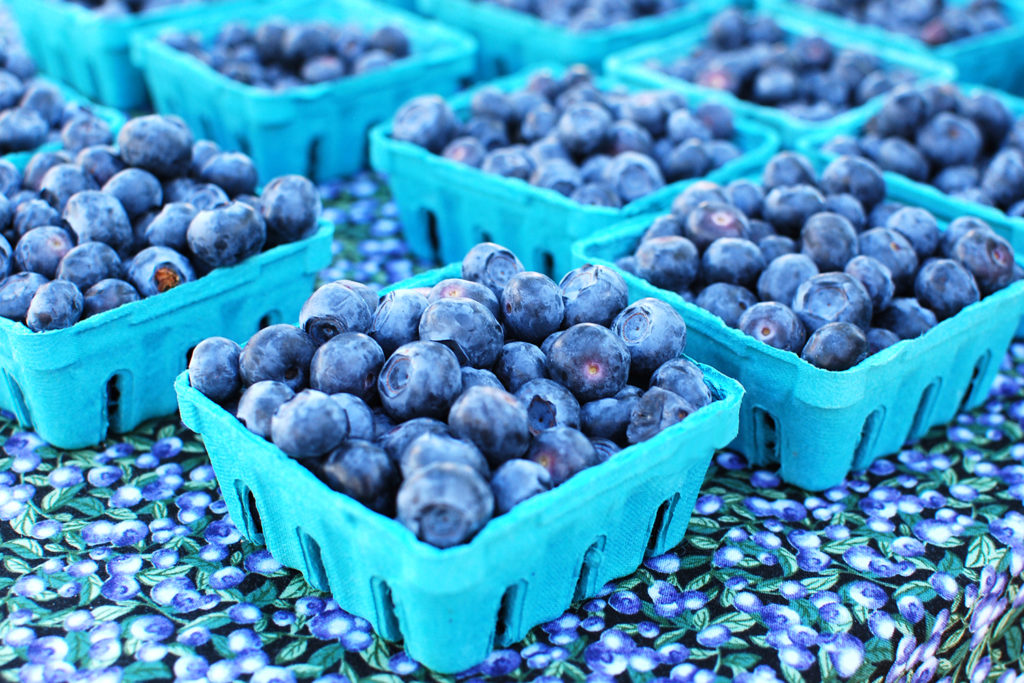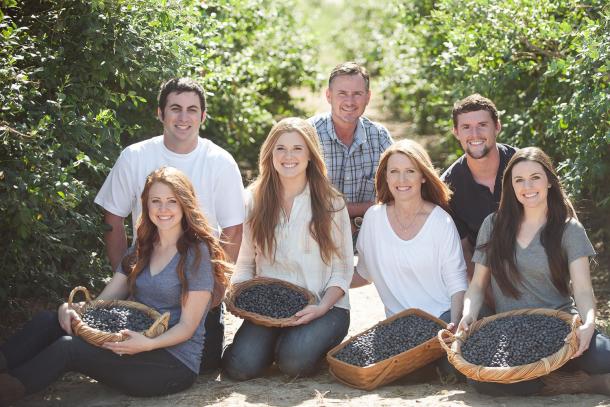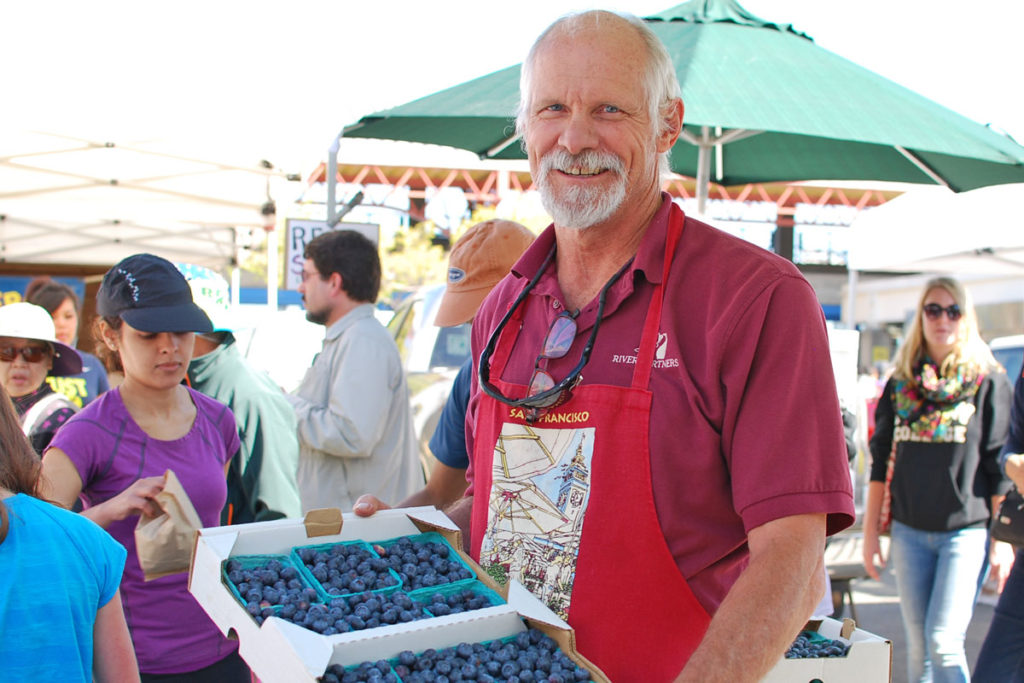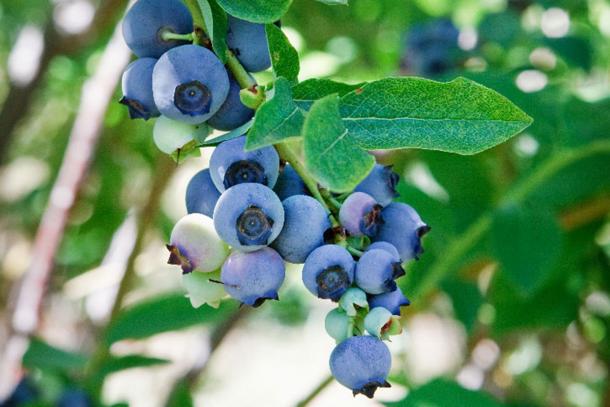True Blue: Blueberries Take Root in California
Brie Mazurek, Foodwise Staff
June 2, 2017

For Kim Sorenson of Triple Delight Blueberries, the first spring blueberry harvest is one of the highlights of her year. “People get so excited at the farmers market,” she says. “Blueberries are a feel-good fruit. It’s something that takes people back to their childhood.”
Today, blueberries tend to conjure up happy visions of gooey pies and freshly baked muffins, but the berry’s roots in America’s collective memory run deep. One of the few cultivated fruit crops native to the continent, wild blueberries were gathered by Native Americans for centuries, and today the U.S. leads the world in blueberry production, with more than 650 million pounds harvested each year.
Blueberry Boom
Efforts to cultivate the “wild” blueberry began in the early 20th century, but it’s only in the last couple decades that locally grown blueberries become a common sight in California’s farmers markets. Since the mid-1990s, blueberry production in the state has surged, with around 5,000 acres currently in production. While California still has a long way to go to catch up with top producers like Michigan, the crop is proving to be a winning commodity for farmers throughout the state.
The highbush blueberries grown in the Northeast need cold winters to thrive, which limited California production until a plant breeding breakthrough occurred in the 1990s. Breeders crossed northern highbush varieties with heat-tolerant wild species in Florida to create highbush hybrids that can thrive in warmer climates, and the California blueberry industry was born. News of studies proclaiming the berry’s potential health benefits, ranging from anticancer properties to improved cardiovascular health and protection from age-related memory loss, have fueled the growth of the market.

Finding a Home for the California Blueberry
Kim and her husband Mark at Triple Delight in Caruthers jumped on the blueberry bandwagon early on, in 1996. A fifth-generation raisin farmer in the Sun-Maid Growers cooperative, Mark decided to diversify the farm by planting five acres of blueberries when they were still a risky proposition in the Central Valley. After much trial and error, the Sorensons found a few varieties that worked in their sandy soil, and they found their niche selling directly to consumers at farmers markets around the state.
Since they started, Kim and Mark have seen the California blueberry industry explode. “There are more big farmers now, some that have hundreds of acres,” Kim says. “There aren’t too many of us small farmers now.” The Sorensons, with about 20 acres of blueberries, have kept the farm’s management and marketing among friends and family. Their three daughters, Johannah, Elizabeth, and Olivia (for whom the company is named), play an active role in the farm.
Since blueberries require acidic conditions, the farm uses thick mulch and drip-irrigated fertilizers to amend their sandy soil. While the farm is not organic, they do not use any sprays on their blueberries, Kim says, since they do not have any diseases or pests—except for small birds, which take their share of the harvest.

Growing Organic Berries in the Foothills
Further north, at Sierra Cascade Blueberry Farm in the foothills east of Chico, the climate is much cooler than the Central Valley. At the farm’s 2,300 feet elevation, blueberries are naturally better adapted to the conditions but must contend with spring frosts and hailstorms, which can all but wipe out an entire crop.
As students at Chico State, John and Armen Carlon helped start the Chico farmers market, selling blueberries and other fruits grown on a test plot at the university. A rare sight at farmers markets, the berries sold like crazy. “I thought, ‘Here’s something that’s hard to grow but easy to sell, and you don’t need a lot land or equipment,’” says John. This got the couple’s gears turning. “The county ag commissioner said, ‘You can’t grow blueberries here,’” Armen remembers. “It was like when your parents tell you can’t do something: you want to do it more.”
Years before the development of the newer heat-tolerant varieties, the Carlons researched and experimented with existing highbush varieties. They eventually saved up enough money to purchase 60 acres between the Sierra Nevada and Cascade mountain ranges and started Sierra Cascade in 1989, at which time there were only a couple hundred acres of blueberry production statewide.
Bumblebees and Blueberries
Currently president of River Partners, an organization dedicated to wildlife habitat restoration, John brings a conservationist’s perspective to blueberry farming. “The more we researched blueberries, the more we liked them because they’re indigenous to America,” he notes. “They evolved here, and that creates opportunities if you want to grow organically.” One of the first certified organic blueberry farms in the state, Sierra Cascade has made a goal of farming “without off-farm inputs, organic or otherwise”—no compost, fertilizers, herbicides, pesticides, or mulches. John credits their blueberries’ success to high levels of microorganisms in the soil, supported by biologically integrated agricultural practice.
Nurturing a diverse ecosystem of wildlife such as native bumblebees, gophers, and birds has helped the farm care for itself. “We try not to look at animals as enemies but as partners in the farming operation,” John explains. The presence of predator birds like owls and Cooper’s hawks has been instrumental in controlling the smaller birds that want their piece of the blueberry pie. “We still have bird damage, but they don’t trash the place,” he adds. “They fly in low and grab a berry and jam out, and we can live with that. We listen to them sing all year, and at the end of the harvest they clean everything up.”
Triple Delight Blueberries returned to CUESA farmers markets several weeks ago, and Sierra Cascade returns with organic berries this week. While the rough winter has taken a toll on many farms, Kim Sorenson reports that this is an exceptional year for blueberries.
“It brings us a lot of joy to grow something that people love so much,” says Kim.
Find Sierra Cascade Blueberry Farm at the Ferry Plaza Farmers Market on Saturdays. Triple Delight Blueberries is at the Ferry Plaza on Saturdays, Tuesdays, and Thursdays. For inspiration on what to do with all those blue beauties, check out our recipe archive.
Photos courtesy of Triple Delight Blueberries and Sierra Cascade Blueberry Farm. This article was updated from a previously published version.

